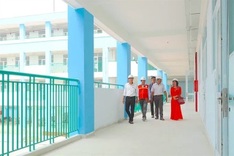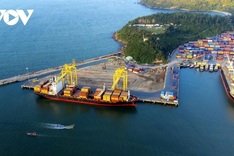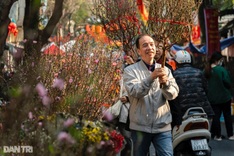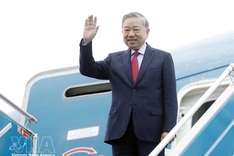
Party General Secretary To Lam and Bulgarian President Rumen Radev at the joint press briefing in Sofia (Photo:VNA)
The announcement came at a joint press briefing following talks between General Secretary of the Communist Party of Vietnam (CPV)To Lam and Bulgarian President Rumen Radev in Sofia on October 23, as part of the Vietnamese Party chief’s official visit to Bulgaria from October 22-24.
At the event, Party General Secretary To Lam said that building upon the positive developments and achievements of Vietnam-Bulgaria ties over 75 years of diplomatic relations, and with confidence in a bright future, the two sides adopted a joint statement establishing the Vietnam-Bulgaria Strategic Partnership. He described it as a key milestone, providing a foundation for promoting bilateral ties for the benefit of their peoples and for peace, stability, and development in the region and beyond.
To Lam stressed that the new cooperation framework will allow both countries to consolidate and deepen relations, leveraging their respective strengths to ensure sustainable development in the new context.
To realise the joint statement, the two leaders discussed and consented to consolidate political trust through high-level exchanges across all channels-Party, State, National Assembly, and people-to-people, as well as in both bilateral and multilateral frameworks. They emphasized enhancing existing cooperation mechanisms, establishing new ones, and deepening cooperation in specific sectors.
Defence and security cooperation will expand under the new partnership framework, including training and academic collaboration between defence academies, UN peacekeeping, cybersecurity, and military medicine.
Amid global economic challenges, both nations agreed to make economic, trade, and investment cooperation a central pillar of the Strategic Partnership. They pledged to coordinate closely to maintain and consolidate free trade, expand market access, and effectively implement the EU-Vietnam Free Trade Agreement (EVFTA), aiming to double bilateral trade in the coming years. Bulgaria is expected to serve as a gateway for Vietnamese goods into the EU market, while Vietnam will similarly facilitate Bulgarian products’ access to the ASEAN market.
The Vietnamese Party leader highlighted science and technology as a key pillar, with planned cooperation in IT, digital transformation, digital economy, e-government, pharmaceuticals, biotechnology, AI, and green energy.
Acknowledging potential in education, training, culture, tourism, health care, labour, and agriculture, host and guest concurred to boost high-quality human resource development, organise cultural and tourism programs, exhibitions, and music exchanges to strengthen mutual understanding and people-to-people ties. They also emphasized supporting the Vietnamese community in Bulgaria to deepen integration and contribute actively to the traditional friendship and all-around cooperation.
They reaffirmed their commitments to close coordination and mutual support in multilateral forums, including the UN and the Asia-Europe Meeting (ASEM). They underscored the importance of ensuring security, safety, and freedom of navigation and overflight in the East Sea, stressing the settlement of disputes via peaceful means in line with international law, particularly the 1982 UN Convention on the Law of the Sea (UNCLOS).
Meanwhile, President Radev described the talks as successful and conducted in an atmosphere of mutual trust and understanding. He said the sides reviewed long-standing friendship and cooperation, set key directions for deepening traditional ties, and identified new areas of cooperation based on shared potential and needs. The two leaders also exchanged views on regional and international issues of mutual concern.
President Radev hailed Vietnam’s achievements in its Doi moi (renewal) process, national development, and international integration, noting that Vietnam’s robust economic performance and growing political influence make it a key player in Southeast Asia.
He expressed hope that both countries will augment cooperation in traditional areas, including defence and security, education and training, science and technology, agriculture, culture, sports, tourism, and people-to-people exchanges. He stressed that General Secretary Lam’s visit has opened new opportunities and visions for bilateral ties.




















